SECULAR RECOMMENDATIONS ON DEFINE AND RESTRICT PROSELYTISM
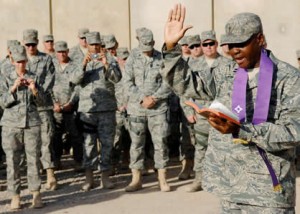 Military culture problematically promotes religious belief. A Department of Defense public affairs officer recently stated that it is acceptable to talk about faith but not to push it on others. However, specific case studies, regulatory requirements, and even basic definition of terms are not publicly available. Congress and military leaders should oppose efforts under the guise of ÔÇÿreligious freedomÔÇÖ or ÔÇÿconscienceÔÇÖ to discriminate or gain special privilege for religion. Proselytism and ubiquitous prayer create a military culture that oppresses nontheists, especially in the absence of any outreach or services.
Military culture problematically promotes religious belief. A Department of Defense public affairs officer recently stated that it is acceptable to talk about faith but not to push it on others. However, specific case studies, regulatory requirements, and even basic definition of terms are not publicly available. Congress and military leaders should oppose efforts under the guise of ÔÇÿreligious freedomÔÇÖ or ÔÇÿconscienceÔÇÖ to discriminate or gain special privilege for religion. Proselytism and ubiquitous prayer create a military culture that oppresses nontheists, especially in the absence of any outreach or services.
POLICY RECOMMENDATION: Provisions for religion and belief should be optional. Services should be available for those who feel they would benefit but should not be mandatory or induce repercussions for those who do not participate.
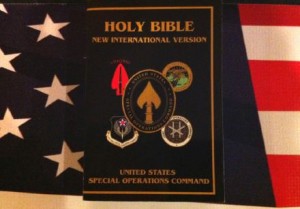 Command endorsement of religion is common throughout the military. Unit logos are printed on Bibles, Bibles are placed in government hotels as a matter of policy, unit mottos commonly have religious themes, and prayer is said at most official command activities and every evening on naval vessels. Eliminating command endorsement of religion provides unimpeded opportunity for personal expression of religion and even facilitation and funding opportunities for religious activities, facilities, and events so long as they are not mixed with official command functions.
Command endorsement of religion is common throughout the military. Unit logos are printed on Bibles, Bibles are placed in government hotels as a matter of policy, unit mottos commonly have religious themes, and prayer is said at most official command activities and every evening on naval vessels. Eliminating command endorsement of religion provides unimpeded opportunity for personal expression of religion and even facilitation and funding opportunities for religious activities, facilities, and events so long as they are not mixed with official command functions.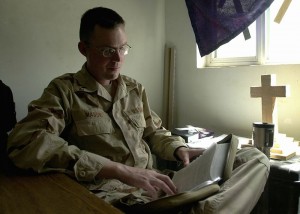 Chaplains currently have training about the diversity of belief systems they will encounter in the military as well as their requirement to serve the wide diversity, from Wiccan to Muslim to Christian Science to Sikh. Chaplains have no such training for the non-theist perspective so they are ill-equipped to provide referrals, provide appropriate resources, or even to be effective in basic counseling services.
Chaplains currently have training about the diversity of belief systems they will encounter in the military as well as their requirement to serve the wide diversity, from Wiccan to Muslim to Christian Science to Sikh. Chaplains have no such training for the non-theist perspective so they are ill-equipped to provide referrals, provide appropriate resources, or even to be effective in basic counseling services.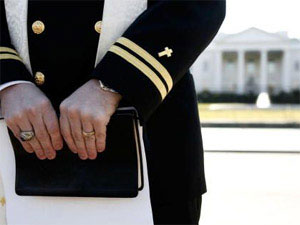 While our military is making substantial progress integrating gay, lesbian and female Americans into its ranks, it continues to discriminate against nontheists. The chaplaincy has never had any formal training in non-theistic beliefs and practices. They are thus unqualified to extend their services to nontheists.
While our military is making substantial progress integrating gay, lesbian and female Americans into its ranks, it continues to discriminate against nontheists. The chaplaincy has never had any formal training in non-theistic beliefs and practices. They are thus unqualified to extend their services to nontheists.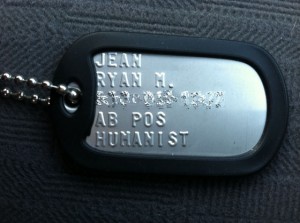 One of the very first in-processing activities for all military personnel is to receive their ID tags. Young troops are asked, ÔÇ£What is your religious preference?ÔÇØ There are over 100 different specific, general, and administrative answers to that question, and military personnel enjoy the right to put their beliefs on their ID tags and official records. Humanists are denied even that basic right. They must choose ÔÇ£atheistÔÇØ or ÔÇ£no religious preferenceÔÇØ which are both terms that state what they donÔÇÖt believe, not what they do believe. Adding an option would be neither administratively cumbersome nor intrusive on other beliefs, but that one additional option would add affirmation that all beliefs are accommodated equally.
One of the very first in-processing activities for all military personnel is to receive their ID tags. Young troops are asked, ÔÇ£What is your religious preference?ÔÇØ There are over 100 different specific, general, and administrative answers to that question, and military personnel enjoy the right to put their beliefs on their ID tags and official records. Humanists are denied even that basic right. They must choose ÔÇ£atheistÔÇØ or ÔÇ£no religious preferenceÔÇØ which are both terms that state what they donÔÇÖt believe, not what they do believe. Adding an option would be neither administratively cumbersome nor intrusive on other beliefs, but that one additional option would add affirmation that all beliefs are accommodated equally.